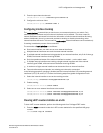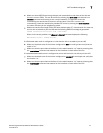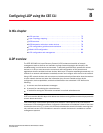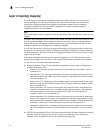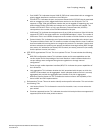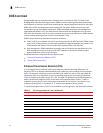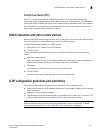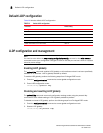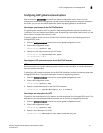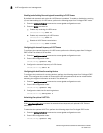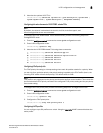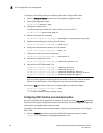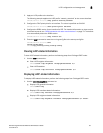
Dell Converged Enhanced Ethernet Administrator’s Guide 79
53-1002116-01
DCBX interaction with other vendor devices
8
Priority Flow Control (PFC)
With PFC, it is important to provide lossless frame delivery for certain traffic classes while
maintaining existing LAN behavior for other traffic classes on the converged link. This differs from
the traditional 802.3 PAUSE type of flow control where the pause affects all traffic on an interface.
PFC is defined by a one-byte bitmap. Each bit position stands for a user priority. If a bit is set, the
flow control is enabled in both directions (Rx and Tx).
DCBX interaction with other vendor devices
When the Dell FCoE hardware interacts with other vendor devices, the other vendor devices might
not have support for the same DCBX version as the Dell FCoE hardware.
The Dell FCoE hardware supports two DCBX versions:
• CEE version (1.0.1)—Based on the CEE standard.
• Pre-CEE version.
To accommodate the different DCBX versions, the Dell FCoE hardware provides the following
options.
• Auto-sense (plug and play)
This is the default. The Dell FCoE hardware detects the version used by the link neighbor and
automatically switches between the CEE version and the pre-CEE version.
• CEE version
Forces the use of the CEE version for the link (auto-sense is off).
• Pre-CEE version
Forces the use of the pre-CEE version for the link (auto-sense is off).
LLDP configuration guidelines and restrictions
Follow these LLDP configuration guidelines and restrictions when configuring LLDP:
• Dell’s implementation of LLDP supports Dell-specific TLV exchange in addition to the standard
LLDP information.
• Mandatory TLVs are always advertised.
• The exchange of LLDP link-level parameters is transparent to the other Layer 2 protocols. The
LLDP link-level parameters are reported by LLDP to other interested protocols.
NOTE
DCBX configuration simply involves configuring DCBX-related TLVs to be advertised. Detailed
information is provided in the “LLDP configuration and management” on page 80.



